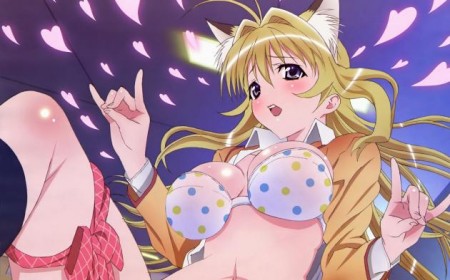Ask John: Why do Anime Critics Hate Fan Service?

Question:
Why are so many anime reviewers anti-fanservice? It’s seems like for these people, no good can come from fanservice in anime. Even if they like the show, they’ll say one of the most overused sayings, “It was good, despite the fanservice.” Why do they feel this way? They complain about otaku pandering but then state they want to be pandered to their usually unrealistic tastes.
Answer:
The rejection of gratuitous exploitation, commonly referred to by the Japanese appelation “fan service,” is almost always a simple, instinctive defensive reflex. From the perspective of anime consumers, the fundamental purpose of anime is to entertain. Certainly, anime can also educate or motivate, and from a corporate perspective the function of anime is to generate revenue. But from an observer’s perspective, anime is primarily supposed to thrill, humor, enervate, shock, surprise, and arouse. So criticizing anime that gratuitously titillate seems like a counter-productive irony. Is criticizing a work fair when the work does its job too well? Criticism may be fairly levied if a work sets about its goal too bluntly. The traditional perception of fine art is that art should be subtle and refined, naturally suggesting its characteristics and gently making its impact rather than assaulting the observer with blunt force. But “fan service” anime is typically not intended to be highly refined fine art. Anime like Aika, Kanokon, Seikon no Qwaser, and Ladies vs Butlers are intended to be lowbrow, blue-collar mainstream commercial entertainment, so criticizing them for including boobs and butts is equivalent to chastising a Hollywood summer blockbuster for being too loud and explosive. A gratuitous production can legitimately be criticized for weakness if it skimps on animation quality or exhibits shallow writing. But criticizing an exploitative anime for being exploitative seems like wasted, misguided effort.
The criticism of “fan service” anime primarily comes from the global market rather than Japanese fans. The very reason why so many “fan service” anime exist is because Japanese viewers enjoy and appreciate these sort of shows. But Japan remains more tolerant of the animation medium than the larger global society. Because American culture continues to presume that 2D animation is a medium for children’s entertainment, typical American cinema critics, who feel innately compelled to justify their role as arbiters of artistic quality, feel compelled to delineate a categorical line between elegant, refined, praiseworthy “fine art” and vulgar commercial exploitation. Granted, select critics may feel a genuine, heartfelt opposition to the sexual objectification of female imagery and oppose such exploitation on the grounds of feminism. That’s an entirely reasonable stance, but it’s also a stance which I think doesn’t apply to most anime critics that criticize “fan service” anime. As “serious” aesthetes that view cinema as art, and critics that want to be taken seriously and not relegated to easy disregard as overgrown children watching gratuitous cartoons, critics frequently compulsively reject anime that doesn’t affirm their own elevated, respectable tastes. In order to be taken seriously, a critic, so the thought goes, must exhibit a nuanced, intellectual appreciation for “serious” art. So the thought goes, indelicate, gratuitous anime drags down the elevated, artistic and beautiful examples of the medium. Critics assume that vulgar anime gives the entire anime medium a poor reputation. But that assumption really is based in a narrow-minded traditionalist view that’s unwilling to give credit where credit may be legitimately due. Select “fan service” anime like Idol Project and Popotan have more substantial artistic and narrative strength, relatively, than many other “more respectable” anime productions.
Otaku pandering is a legitimate point of criticism. Series like Akikan and Zettai Shougeki ~ Platonic Heart deserve harsh criticism because these productions have blunt “fan service” and no other redeeming, praiseworthy qualities. But too often critics automatically conclude that “otaku pandering” is itself negative. The assumption that art must be naturalistic, subtle, elegant, and polite to be commendable is a shortsighted, outdated notion that countless “serious” film critics cling to in order to protect their own egos. Excellent “fan service” anime such as Aika, Kanokon, Idol Project, and Popotan demonstrate that gratuitous “fan service” can supplement and enhance the quality and enjoyment already engendered by strong narrative, characterization, and animation quality.
Add a Comment
You must be logged in to post a comment.


I guess no one can criticize anime for gratuitous titillation after Spring Breakers.